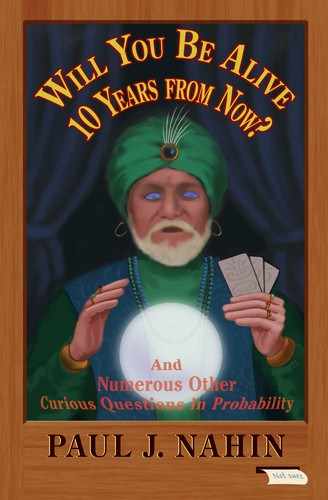A Puzzle for When the Super Bowl Is a Blowout
13.1 THE PROBLEM
Suppose you and some friends are watching a Super Bowl game on TV and one of the teams is ahead by six touchdowns at the end of the third quarter. Instead of turning to the Weather Channel to get some excitement, do this: challenge your buddies with the following puzzle, and watch their dull, bored eyes light up at the anticipation of working on a good math problem! Be sure to have plenty of extra beer and chips handy because (as is well known) doing real math builds a superappetite.
Let’s imagine that the 32 teams in the NFL decide to play a season in the following way. Each team will play every other team once (there is no AFC or NFC, or any other sort of divisional nonsense to muck things up). Further, imagine that all the teams are perfectly matched, and so every game is a toss-up; that is, each team has probability 1/2 of winning any given game. All the games allow for overtime play, and so there are no ties; every game is a win for one team and a loss for another. This will be a pretty long season, with a total of (31)(32)/2 = 496 games, but real football fans everywhere will love it! (So will doctors, when players arrive at their offices and hospitals in ambulances at the end of the season, or perhaps even sooner.)
Here’s the question: what’s the probability that all 32 teams finish the season with different records, that is, each team will have a different number of games won?
Let’s solve this problem for the general case of n teams and then, when we’re finished, we will substitute n = 32. There are two key observations that unlock the solution to this problem. The first is that the most games a team can win is n − 1 (the number of teams each team plays) because no team can play itself, and the fewest games a team can win is zero. The number of numbers from 0 to n − 1 is n, and therefore, when we assign different win totals to each team there are just enough to go around. There is a total of n! ways to assign n numbers to n teams. The second key observation is that the probability for each of the n! ways is the same. This follows by symmetry; there is nothing to distinguish one equally skilled team from another. So, if we can calculate the probability for any one of the n! ways—let’s call that probability P—then the answer to our problem will be just n!P.
Suppose we label the teams as no. 1 to no. n, and agree to write the end-of-season games-won totals for the teams from left to right, starting with team no. 1. Then, let’s focus our attention on the particular sequence of
n − 1, n − 2, n − 3, …, 3, 2, 1, 0.
That is, team no. 1 won all of its n − 1 games, team no. 2 won all but one of its n − 1 games, team no. 3 won all but two of its n − 1 games, and so on, all the way to team no. n, which won none of its n − 1 games. This means team no. 2 suffered its one loss at the hands of team no. 1 (it couldn’t have lost that one game to any other team because then it would have beaten team no. 1, which we know it didn’t). In the same way, team no. 3 suffered its two losses at the hands of team no. 1 and team no. 2. And so on. That is, as we move from left to right through the above sequence, each team’s losses were at the hands of the teams to its left.
So, the probability of the above particular sequence is the probability team no. 1 won n − 1 games times the probability team no. 2 won n − 2 games (that team’s one loss has already been accounted for in the previous step) times the probability team no. 3 won n − 3 games times … and so on, times the probability team n won zero games. That is,
The answer to our question, then, is ![]() . For the NFL, with n = 32, this probability is 32!/2496 = 1.3 × 10−114. Not absolutely impossible, but pretty darn close to impossible.
. For the NFL, with n = 32, this probability is 32!/2496 = 1.3 × 10−114. Not absolutely impossible, but pretty darn close to impossible.

